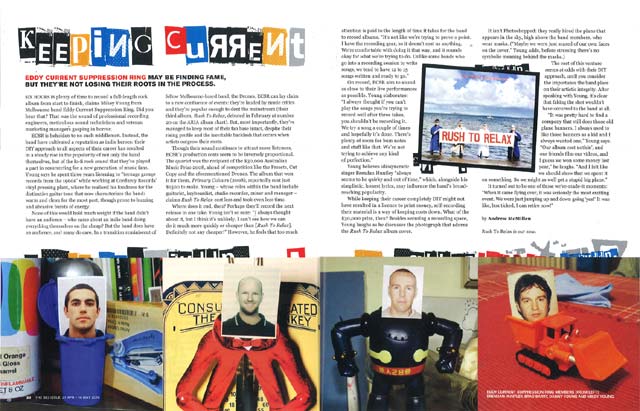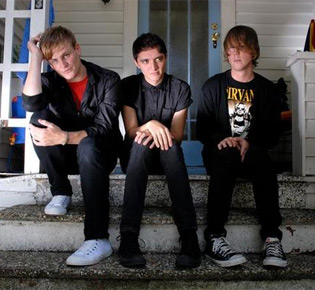The Big Issue story: ‘Keeping Current: Eddy Current Suppression Ring’, April 2010
A story for The Big Issue #353 on Eddy Current Suppression Ring. Click the image below for full-size, readable version; story text is included underneath.
Keeping Current
Six hours is plenty of time to record a full-length rock album from start to finish, claims Mikey Young from Melbourne band Eddy Current Suppression Ring. Did you hear that? That was the sound of professional recording engineers, meticulous sound technicians and veteran major label marketing managers gasping in horror.
ECSR is beholden to no such middlemen. Instead, the band have cultivated a reputation as indie heroes, of sorts: their completely hands-on, DIY approach to all aspects of their career has resulted in a steady rise in the popularity of not only the band themselves, but of the lo-fi, old-school garage rock sound that they’ve played a large part in resurrecting for a new generation of Australian music fans. Young tells me that he spent three years listening to “teenage garage records from the ’60s” while working at Corduroy Records’ vinyl pressing plant, where he realised his fondness for the distinctive guitar tone that now characterises the band: warm and clean for the most part, though prone to occasional buzzing, abrasive bursts of energy.
None of the above would hold much weight if the band didn’t have an audience. Who cares about an indie band doing everything themselves, for cheap? But the band do have an audience, and many do care. In a transition reminiscent of fellow Melburnians The Drones in recent years, Eddy Current Suppression Ring can lay claim to a rare confluence of events: they’re lauded by music critics, and they’re popular enough to dent the mainstream (their third album, Rush To Relax, debuted in mid-February at #20 on the ARIA album chart). But most importantly, they’ve managed to keep most of their fan base intact, despite their rising profile and the inevitable backlash that occurs when artists outgrow their roots.
Though their lo-fi garage rock sound continues to attract more ears, the band’s production costs seem to be inversely proportional. The quartet were the recipients of the $30,000 Australian Music Prize (AMP) in March 2009 ahead of competition like The Presets, Cut Copy, and the aforementioned Drones. The album that won it for them, Primary Colours (2008), reportedly cost just $1,500 to make. Young – whose roles within the band include guitarist, keyboardist, studio recorder, mixer, and manager – claims Rush To Relax cost less and took even less time.
Where does it end, then? The logical conclusion is that they’ll record the next release in one take. Curious, I put the idea to Young. “I always thought about it, but I think it’s unlikely. I can’t see how we can do it much more quickly or cheaper than [Rush To Relax]. Definitely not any cheaper!” However, he feels that too much attention is paid to the length of time it takes for the band to record albums. “It’s not like we’re trying to prove a point. I have the recording gear, so it doesn’t cost us anything. We’re comfortable with doing it that way, and it sounds okay for what we’re trying to do. Unlike some bands who go into a recording session to write songs, we tend to have 12 to 15 songs written and ready to go.”
On record, ECSR aim to sound as close to their live performances as possible. Young elaborates: “I always thought if you can’t play the songs you’re trying to record well after three takes, you shouldn’t be recording it. We try a song a couple of times and hopefully it’s done. There’s plenty of room for bum notes and stuff like that. We’re not trying to achieve any kind of perfection.”
Young believes idiosyncratic singer Brendan Huntley “always seems to be quirky and out of time,” which, alongside his simplistic, honest lyrics, may influence the band’s broad-reaching popularity.
While keeping their career completely DIY might not quite result in the proverbial license to print money, self-recording their material is “a way of keeping costs down, that’s for sure,” says Young. What of the AMP cash they won 12 months ago, then? Besides securing their own recording space, Young laughs as he discusses the photograph that adorns the Rush To Relax album cover.
It isn’t Photoshopped: they really hired the plane that appears in the sky, high above the band, who are wearing masks (“Maybe we were just scared of our own faces on the cover,” he adds, before stressing that there’s no symbolic meaning behind the masks). The cost of this venture seems at odds with their DIY approach, until you consider the importance the band place on their artistic integrity. After speaking with Young, I’m convinced that faking the shot wouldn’t have occurred to the band at all.
“It was pretty hard to find a company that still does those old plane banners. I always used to like those banners as a kid and I always wanted one,” the guitarist says. “Our album cost nothin’, and our friends film our videos, and I guess we won some money last year,” – he laughs. “And I felt like we should show that we spent it on something. So we might as well get a stupid big plane.”
It turned out to be one of those we’ve-made-it moments: “When it came flying over, it was seriously the most exciting event. We were just jumping up and down going ‘yes!’ It was like, box ticked, I can retire now!”
by Andrew McMillen
Video for the Rush To Relax title track embedded below.

 Andrew Wilson of Die! Die! Die!
Andrew Wilson of Die! Die! Die!